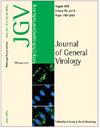Transcriptional and hormonal profiling uncovers the interactions between plant developmental stages and RNA virus infection
IF 3.6
4区 医学
Q2 BIOTECHNOLOGY & APPLIED MICROBIOLOGY
引用次数: 0
Abstract
Arabidopsis thaliana is more susceptible to certain viruses during its later developmental stages. The differential responses and the mechanisms behind this development-dependent susceptibility to infection are still not fully understood. Here we explored the outcome of a viral infection at different host developmental stages by studying the response of A. thaliana to infection with turnip mosaic virus at three developmental stages: juvenile vegetative, bolting, and mature flowering plants. We found that infected plants at later stages downregulate cell wall biosynthetic genes and that this downregulation may be one factor facilitating viral spread and systemic infection. We also found that, despite being more susceptible to infection, infected mature flowering plants were more fertile (i.e. produce more viable seeds) than juvenile vegetative and bolting infected plants; that is, plants infected at the reproductive stage have greater fitness than plants infected at earlier developmental stages. Moreover, treatment of mature plants with salicylic acid increased resistance to infection at the cost of significantly reducing fertility. Together, these observations support a negative trade-off between viral susceptibility and plant fertility. Our findings point towards a development-dependent tolerance to infection.转录和激素分析揭示了植物发育阶段与 RNA 病毒感染之间的相互作用
拟南芥在后期发育阶段更容易受到某些病毒的感染。这种依赖发育的易感性背后的不同反应和机制仍未完全明了。在此,我们通过研究拟南芥在幼苗、萌芽和成熟开花植株三个发育阶段对萝卜花叶病毒感染的反应,探讨了病毒感染在不同宿主发育阶段的结果。我们发现,后期受感染的植株会下调细胞壁生物合成基因,这种下调可能是促进病毒传播和系统感染的一个因素。我们还发现,受感染的成熟开花植株尽管更容易受到感染,但其繁殖力(即产生更多有活力的种子)却比幼年无性繁殖植株和萌芽期受感染植株更高;也就是说,生殖期受感染的植株比发育早期受感染的植株具有更高的繁殖力。此外,用水杨酸处理成熟植株可提高抗感染能力,但其代价是显著降低育性。总之,这些观察结果支持病毒易感性与植物肥力之间的负权衡。我们的研究结果表明,植物对感染的耐受性取决于生长发育。
本文章由计算机程序翻译,如有差异,请以英文原文为准。
求助全文
约1分钟内获得全文
求助全文
来源期刊

Journal of General Virology
医学-病毒学
CiteScore
7.70
自引率
2.60%
发文量
91
审稿时长
3 months
期刊介绍:
JOURNAL OF GENERAL VIROLOGY (JGV), a journal of the Society for General Microbiology (SGM), publishes high-calibre research papers with high production standards, giving the journal a worldwide reputation for excellence and attracting an eminent audience.
 求助内容:
求助内容: 应助结果提醒方式:
应助结果提醒方式:


